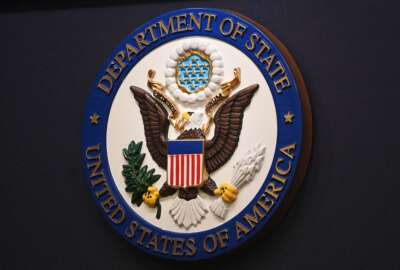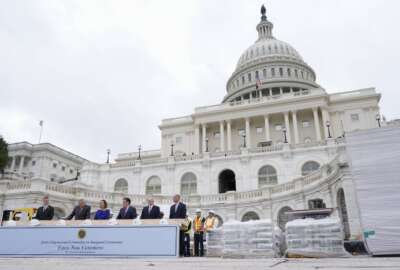Senate version of NDAA to require automatic draft registration for all citizens
The House version of the NDAA, passed last month, requires automatic registration for all men. A new Senate version would expand that to women as well.
- The Senate Armed Services Committee’s version of the defense policy bill would make registering for military conscription automatic for all citizens between the ages of 18 and 26. The House passed its version of the bill last month that would automatically register men with the Selective Service, which they are already legally required to do. The Senate Armed Services Committee wants to expand automatic registration to include women. Sen. Jack Reed (D-R.I.), chairman of the committee, spearheaded the proposal. The committee’s version of the Defense bill is now headed to the Senate floor for debate.(FY2025 NDAA bill text - Senate Committee on Armed Services)
- The Senate Armed Services Committee wants to change the 2022 defense policy bill provision that tells the Defense Department how to buy cyber services. The fiscal 2022 defense bill requires the Defense Department to centralize the procurement of cyber products and services. The bill says the DoD components can’t independently purchase cyber services unless they can buy it at a lower price. An amendment in the 2025 defense policy bill would allow DoD components to buy cyber independently if they can demonstrate the compelling need for the product or to ensure product competition within the market. (Senate NDAA to give more authority to DoD components to buy cyber services - Senate Committee on Armed Services)
- The federal government’s landlord told Congress it needs more funds to offload unneeded office space. The General Services Administration is asking Congress for a $425 million dollar “optimization” fund in next year’s budget. The funding would help agencies move out of underutilized office space. Elliot Doomes is the commissioner of the GSA’s Public Buildings Service. He said GSA helped agencies consolidate office space about 90 times over the past eight years. But they missed more than 120 other chances to consolidate and save hundreds of millions of dollars. “We’re going to have to spend some money in order to save some money,” Doomes said.(GSA says more funds needed to offload unneeded federal office space - Federal News Network )
- The Department of Veterans Affairs is ending mandatory overtime for most employees who process benefits claims. The Veterans Benefits Administration is shifting to a system of mostly voluntary overtime that’s capped at a maximum of 20 hours each month. VBA will keep mandatory overtime in place for some employees. That includes workers who process claims for military sexual trauma, radiation exposure and pensions. Joshua Jacobs is the VA’s Under Secretary for Benefits. He said VBA relied on mandatory overtime for the past seven years, to keep up with its workload. “I have never thought that mandatory overtime is a sustainable operating practice,” Jacobs said. (VBA media roundtable - Department of Veterans Affairs )
- The U.S. Citizenship and Immigration Services is dealing with ongoing staffing issues, even years after a hiring freeze ended. But despite staffing challenges, a large backlog and funding limitations, USCIS employee engagement is still on the rise. The agency's score in the Partnership for Public Service's Best Places to Work rankings rose by more than 4 points for 2023. And USCIS leaders are making further adjustments to try to support the current workforce, by holding town halls and improving supervisor training.(Amid hiring issues, USCIS’ Jaddou aims to boost current workforce - Federal News Network)
- The ink is finally drying on a new union contract for employees at the Environmental Protection Agency. EPA leaders have officially signed a new collective bargaining agreement with the American Federation of Government Employees. The new contract covers about 8,000 staff members at the agency. AFGE and EPA first approved the new contract in May. But they were still moving through the final steps of the approval process until just this week. The new agreement locks in several new provisions: one on diversity, equity, inclusion and accessibility; and another on scientific integrity.(EPA and AFGE collective bargaining agreement - Environmental Protection Agency)
- A Department of Homeland Security Office is bouncing back after facing attrition concerns earlier this year. DHS’ Countering Weapons of Mass Destruction Office has hired about 30 people over the last few months. That includes 10 people at last month’s DHS job expo in northern Virginia. The CWMD office had lost two dozen people — about 10% of its federal workforce — after Congress failed to reauthorize the office last year. But CWMD still has funding, and it plans to continue hiring new staff through the remainder of 2024. (How one DHS office is trying to bounce back amid low morale numbers - Federal News Network )
- The Department of Homeland Security is recruiting 20 more experts into its Artificial Intelligence Corps. Individuals who are hired will help DHS components pursue AI and machine learning applications. Others will be involved in shaping oversight and policy for the emerging technology. DHS announced the first 10 hires for its AI Corps in June. The department plans to hire a total of 50 AI experts through the end of 2024. Applications for the latest recruiting round are open through September 6th. (Job posting for AI technology expert - USAJOBS)
Copyright © 2025 Federal News Network. All rights reserved. This website is not intended for users located within the European Economic Area.
Daisy Thornton
Daisy Thornton is Federal News Network’s digital managing editor. In addition to her editing responsibilities, she covers federal management, workforce and technology issues. She is also the commentary editor; email her your letters to the editor and pitches for contributed bylines.
Follow @dthorntonWFED






